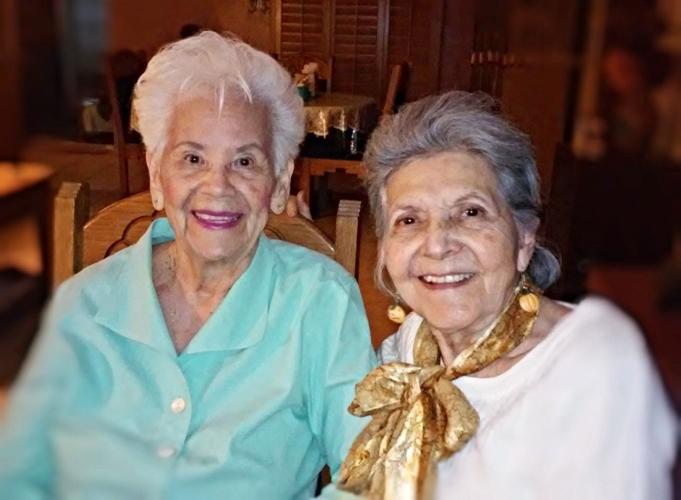There they were, spread across the ballroom, with spouses, family and friends, reminiscing, laughing, hugging. The women, most of whom have been friends for life, were celebrating six decades of community involvement and commitment.
They call their social network Club Duette.
The women of Club Duette had gathered Sunday afternoon at El Casino Ballroom in South Tucson, where many of their social gatherings have been held, for the group’s 60th anniversary. The women of Club Duette were part of a network of similar women’s and men’s groups that made up Tucson’s social scene before and after World War II. Other groups included Club Mavis, Los Universitarios, Little Flower and Monte Carlo.
Few of the clubs have survived.
Club Duette has been a part of my life and that of my three siblings. We grew up with the group, since our mother, Julieta Bustamante Portillo, and our tía Alva Bustamante Torres, have been members for all these 60 years. There were Club Duette dances (which we could not attend) and there were Duette family picnics (where I could meet the daughters of club members).
The club also raised $20,000 over the years for various Tucson charities and organizations, and to help members who lost a spouse or family. Its first donation in 1962 was $20!
But as I scanned the ballroom decorated in a soft blue hue, I saw more than a group of friends toasting to their friendships and dancing to mambos, cumbias and boleros.
For me, Club Duette, the women and their spouses, some of whom are sons and daughters of immigrants, represent that vital generation of Mexican-American families in pre- and post-World War II.
The majority of the club’s members were stay-at-home moms. Their spouses were largely blue-collar workers, but some husbands served in the military or were firefighters or sold cars.
They raised their families, went to church, paid their taxes. They celebrated weddings and mourned at funerals. And while most Club Duette members went only as far as Tucson High School, with several attending the University of Arizona, many of them saw their children receive college degrees and go on to professional careers.
Inside the ballroom’s walls, there was not a single politician or chief executive officer. There were no ex-professional athletes or anyone “famous.” El Casino was filled with ordinary folks who formed the backbone of Tucson.
The women of Club Duette, who are now in their 70s and 80s, were children growing up in the wake of the Great Depression. They didn’t have much. Scarcity abounded. Families scrimped and saved.
The vast majority grew up in Tucson, in Mexican-American homes in what was then a very small city.
By 1940 Tucson’s population was slightly more than 36,000 people, of which about 11,000 were Mexican-American, or about 30 percent of the city’s census. On the cusp of global conflict, 75 percent of Tucson’s Mexican-American families were blue-collar. Tucson’s Anglos were 35 percent blue collar, according to Thomas E. Sheridan’s “Los Tucsonenses: The Mexican Community in Tucson, 1854-1941.”
When war finally came home, the older siblings of some Club Duette members went to serve. Tucson’s Mexican-American families on the home front were as patriotic and brave as any others, even if opportunities were denied to them in Tucson. Mexican women, too, became Gold Star Mothers, that special group who lost a child in the war.
When the war ended, the girls of Club Duette entered high school. They were bobby socks girls for the most part who enjoyed hanging out at a downtown lunch counter. But they were equally comfortable listening to a trio playing a Mexican love song.
But when war came again, this time on the Korean peninsula, the girls said goodbye to brothers again and to boyfriends, some of whom served with Easy Company, a Tucson Marine Corps reserve unit made up of boys from the barrio. Several did not return.
When the Korean war ended, the families began to grow, along with Tucson, spreading in all four cardinal directions. They loved their town and they worked to make it the best.
In the ballroom I saw the foundation, the muscle, the values that post-World War II Tucson was built on.





